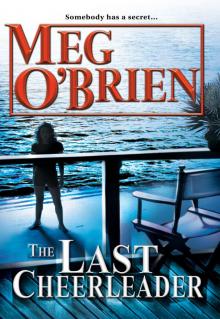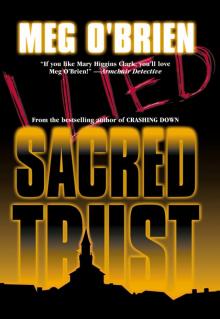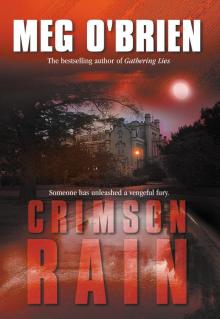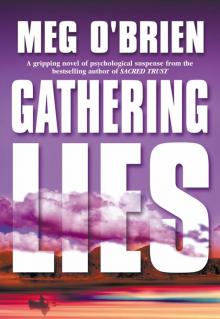- Home
- Meg O'Brien
Gathering Lies
Gathering Lies Read online
The woman sat tied to an upright chair, her arms bound from elbow to shoulder. She no longer squirmed to get free. By now she knew that wouldn’t help.
“Don’t you understand?” the man said again as he paced before her. His tone was distraught, worried. “You’re never getting out of here if you don’t tell me what I need to know.”
“I’ll die first, you son of a bitch,” she managed through dry, cracked lips.
“It’s beginning to look like you just might,” he said.
But his voice shook. She knew he was close to breaking, too.
The woman bowed her head and closed her eyes. Her neck ached from holding it stiff with fear, and her eyes burned from the too-bright light she’d been under for more than seven hours. She didn’t know how much more she could take.
The man knelt in front of her and whispered in her ear, all the while stroking her knee softly, then her thigh, where a bruise darkened by the minute.
“I don’t want to have to hurt you, Angel. You’re a beautiful woman. Just tell me. I promise I’ll let you go.”
“You’ll let me go?” she whispered. “Really?”
“Yes,” he whispered, rubbing her thigh more seductively now. “I promise. I’ll let you go. Just tell me.”
In a flash, the woman jerked back her right foot, then swung it forward with incredible force. Her pointed, high-heel shoe connected with his groin.
“Go to hell!” she yelled, her face contorting. “Go to goddam hell!”
Also available from MIRA Books and MEG O’BRIEN
CRASHING DOWN
SACRED TRUST
MEG O’BRIEN
GATHERING LIES
I would like to thank the following people, without whose help this book could never have been written:
My son, Greg, whose editorial skills are truly excellent, and who saved my neck during the infamous “end of the book” when nothing was making any sense.
All my children—Robin, Greg, Amy, Kevin and Kate—who put up with me when the muse takes over and I’m miserable to be around.
Cathy Landrum, who is not only an excellent research assistant, but who, along with her husband and very patient designated driver, Randy, is an adventurous traveling companion, as well.
Heather Iker, for being my expert legal reader and keeping me straight on the ins and outs of the justice system. Thanks for all the hours, Heather, and for being a great lawyer and friend.
Al Wilding, retired Seattle police officer, resident of the San Juan Islands and new friend. By some twist of fate I found him on the Net, just when I needed another expert reader. Many thanks, Al, for your advice and support throughout the past months, and to your beautiful wife, Lotte, who puts up with our constant e-mailing. Thanks, too, Lotte, for spreading the rumor around Shaw Island that Al and I were having an online affair. I can only imagine what that’s done for my reputation at Our Lady of the Rock Priory!
Rick Boucher, owner of San Juan Web Talk, the Web site about the San Juan Islands—which was where I “met” Al Wilding in the first place. Thanks, Rick. Your Web site is an invaluable source of information about the islands.
Last and certainly not least, Amy Moore-Benson and Dianne Moggy, my editors at MIRA, who keep me wanting to write even when I’m ready to hie me off to a nunnery and hoe beans for the rest of my life.
CONTENTS
Prologue
PART I: THE SETUP
Chapter 1
Chapter 2
PART II: THE PURSUIT
Chapter 3
PART III: THE CRIME
Chapter 4
Chapter 5
Chapter 6
Chapter 7
Chapter 8
Chapter 9
Chapter 10
Chapter 11
Chapter 12
Chapter 13
Chapter 14
Chapter 15
Chapter 16
Chapter 17
Chapter 18
Chapter 19
Chapter 20
PART IV: THE ARREST
Chapter 21
Addendum
Prologue
ANGEL
April 7
The woman sat tied to an upright chair, her arms bound from elbow to shoulder. She no longer squirmed to get free. By now, she knew that wouldn’t help.
“Don’t you understand?” the man said again as he paced before her. His tone was distraught, worried. “You’re never getting out of here, if you don’t tell me what I need to know.”
“I’ll die first, you son of a bitch,” she managed through dry, cracked lips.
“It’s beginning to look like you just might,” he said.
But his voice shook. She knew he was close to breaking, too.
The woman bowed her head and closed her eyes. Her neck ached from holding it stiff with fear, and her eyes burned from the too-bright light she’d been under for more than seven hours. She didn’t know how much more she could take before the inevitable happened, before words poured forth despite her will, words she had vowed never to tell him, not in a million years.
“Get it over with,” she said dully, choking on a sob. “Please. Just do it now.” Her eyes were red and swollen with tears, her tone begging. “If we ever meant anything to each other…”
The man knelt in front of her and whispered in her ear, all the while stroking her knee softly, then her thigh, where a bruise darkened by the minute.
“I don’t want to have to hurt you, Angel. You’re a beautiful woman. Just tell me. I promise I’ll let you go.”
“You’ll let me go?” she whispered. “Really?”
“I told you I would,” he said softly. “You think I like this? God, I hate it! And it could all be over. You could be home, safe and sound. All you have to do is tell me.”
“You’ll let me go?” she said again, looking into his eyes, the eyes she once told him were more lovely than those of any man she’d ever known.
“Yes,” he whispered, rubbing her thigh more seductively now, letting his hand roam to the soft familiar flesh of the dark V, stroking her there as if she were a pet cat. A tingle ran through him as he realized she hadn’t worn panties. That’s how much she had trusted coming here this way.
“Yes,” he said huskily, “I promise. I’ll let you go. Just tell me.”
In a flash, the woman jerked back her right foot, then swung it forward with incredible force. Her pointed, high-heel shoe connected with his groin. The man screamed, falling back.
“Go to hell!” she yelled, her face contorting. “Go to goddamn hell!”
In an automatic response to the searing pain, the man leapt to his feet and swung at the woman with his fist. It connected with the side of her head, and the chair she was tied to wobbled. Teetering precariously, it fell back, striking the cast-iron, wood-burning stove. The woman’s head hit the sharp-edged corner of the stove with a resounding crack. Blood mushroomed from her scalp and her jaw went slack, her eyes staring. The man bent over her, still holding himself against the red-hot pain that seared through his groin.
“No!” he screamed. “Goddamn it, no!”
Kneeling again he quickly checked her pulse. It fluttered, then died. He put his ear to her mouth, but heard only the last sigh of a dying breath.
“Oh, God,” he moaned. “Oh, God, you can’t do this.”
He fancied the woman’s lips curved in a tired smile.
He sat for a long while on the floor beside her. “You were always so damn stubborn,” he said softly. “Why couldn’t you just have done things my way?”
He would miss her. But only a little. And now he would have to explain why he’d failed.
The man stood gingerly, still clutching himself. Light-headed, he stumbled to a telephone on
the wall. Lifting the receiver, he punched in a number.
“She’s gone,” he said heavily, when a voice answered.
A small silence.
“No, I mean she’s gone. Dead.”
A tinny rumble of angry sound came through.
“No, she didn’t—Look, it wasn’t my—” He pressed his fist to his forehead. “Yes, I know. Yes. Right away.” He dropped the receiver back onto the hook.
“Damn you, Angel!” he cried, looking at the woman’s lifeless body. “All you had to do was tell me. I would have let you go.”
But he knew that wasn’t true. He would have had to kill her in the end.
And now he’d have to get to the other one. He’d have to make her give up the secret this woman had carried to her death.
If not, he’d be six feet under, along with this pile of useless flesh on his floor.
The pain in his groin ebbed, but not his anger. The man was less than gentle as he lifted the woman’s body and squeezed it into a steamer trunk he kept in the closet. She was too large for the trunk, and as he pushed and shoved he heard bones break.
The lock was flimsy and didn’t catch well. But that was all right. Where the trunk was going this time, it didn’t need a lock. He went to the kitchen and got a towel, which he drenched in cold water. This he used to wipe the blood from the braided rug, then from his hands.
Looking around the small cabin, he debated whether to take the trunk out and bury it now, or leave it here till his job was done. Hell, he might end up with a mass grave before this mess was over.
No, he’d better do it now. The place could be broken into while he was gone.
He dragged the trunk out onto the porch and glanced around for signs of anyone nearby. Even without looking, though, he knew he was alone. That’s one thing he liked about this place. It was a hideaway, for now. But in the future it could be a shelter where he could sit and think. He could picture himself a Thoreau—without, of course, the pond. It was here he might spend weekends and summer vacations, on this very porch, reading.
That is, if everything didn’t go all to hell.
He looked down at the trunk, a moment of sympathy for the woman filling him with guilt and remorse. His life wasn’t supposed to turn out like this. Neither was hers.
But it wasn’t his fault. If she’d told him everything right off, none of this would have happened.
Dragging the trunk down the steps, he noted that the sky was an odd yellow, the air still. Hot, for April. But that was the Northwest for you. One week snow, the next a heat wave. He wondered if there would be a thunderstorm, and knew he’d have to bury the trunk deep, so the upper layer of dirt wouldn’t wash away.
He got a shovel from the utility shed and went back to where he’d left the trunk, and began to dig. It was hot, tiring work, and he was still shaking from the unexpected way this had turned out. Still, he’d worked out for years, and was grateful for the hard, efficient muscles that made it possible for him to accomplish this.
When he was several feet down, he scrambled out and used his last ounce of strength to pull the trunk over to the hole, then dumped it in. Looking down into the makeshift grave, he began to sway. Wiping his forehead, he thought, God, I feel dizzy. Must be hunger. Or this crazy weather.
But then his feet began to move, and without volition they stumbled forward. Throwing his arms out, the man tried to keep his balance, like a chicken flapping its wings. But nothing stopped the forward fall, and the man screamed out. His boots slid on the crumbling edge of the grave, and horror overtook him as the ground shook and the trunk rocked back and forth. The flimsy lock snapped open, and the lid flew back revealing the woman’s bloody, broken body. The man fell on top of her, his face smacking the ooze from her skull. Dirt rained down upon them both, and like the wrath of God the ground continued to rumble and shake. Dirt choked his throat and stung his eyes. He tried to burrow an airhole, a space to keep him breathing till help arrived. But he knew, too, that help would not arrive. He was too far out, too isolated.
The next instant there appeared before him a tunnel of light. At first he thought he was dying, and he half expected to see his mother and all his dead relatives there, the way they said it happened on all those talk shows. Panic overwhelmed him. He’d read enough about near-death experiences to know they weren’t always sweetness and light. One could land in hell. Then, suddenly, the sides of the tunnel burst open with a whoosh. Light rushed in. It took the man a moment to realize it was real light, sky light, a hole in the grave. The ground in its shaking had opened a path—a path he could follow, if only he could get an arm out and dig.
“Dig, man!” he half screamed, his fingers scrabbling in the dirt like a crazed, panicky crab. “Dig!” He had to survive. He’d been given a second chance, and he had to grab it.
There was only one person left, now, who knew where that evidence was. Sarah Lansing. He would get to her, make her tell him where it was. Then he would kill her. It would be easier now, after this.
PART I
THE SETUP
1
SARAH LANSING
Seattle, WA
May 5
Words.
Words have consumed me, of late. They’re just about all I have left, now, the only solace that remains. I sit here at my father’s desk, in the house I grew up in, telling my story to a computer screen. I write, now, for no eyes but my own. Every night I obliterate what I’ve written, in fear of having my work confiscated by the police. Days, my fingers hover over the keyboard, ever ready to hit the delete key in the event that what passes for the law should show up at my door.
Meanwhile I gather my thoughts, putting them into words.
Gather…Gathering…Gathered.
I have always loved that word. It has a multitude of meanings, as in storm clouds gathering, or supplicants gathered for prayer. It can mean a woman gathering material at the waist, as my mother did, to make a skirt. One can gather one’s thoughts, gather a man into oneself, gather children at one’s knee.
Or—as was the case at Thornberry—it can mean a gathering of lies.
We were all lying about something that spring. And thus, having come together, having gathered for reasons none of us fully understood, we harmed ourselves, and each other, in ways we had no notion of before we began.
I will tell you this: Each of us did what we had to do. Of that, I am clear, to this day. A path opened up and we took it, not even thinking where it might lead.
It led us straight into hell.
2
It was the spring of the Great Seattle Earthquake, and life had been bad enough without the ground opening up beneath our feet. But there it is. Life has a way of taking over, of running amok, and there’s not much point in fighting it—any more than there’s any point in fighting it when a man leaves, betrays, lets one down.
At first you ask yourself, was it my fault? Did I wear the wrong outfit, have the wrong shade of hair? Should I go shopping for something younger, perkier?
Buy a bottle of Clairol Midnight Brown?
I remember Ian saying once that he’d been in love, at twenty, with an Italian girl whose dark brown hair fell in waves to her waist. His pet name for her had been Sophia, he told me, as in Loren. His first love, he said, the one and only true love of his life.
He said this the day he broke it off with me, and I’ve always wondered if it wasn’t just what he told himself, to excuse the fact that he hadn’t had a lasting relationship in all the years since.
Or, again, maybe it was me. Am I too blond? Too amenable? Or conversely, too argumentative?
Life also has a way of burdening one with questions that have no answers, at least none one wants to hear. Therefore, regardless of the fact that I’d been to college and was thought to be a relatively bright woman, with a career I’d been excellent at, those are the kinds of crazy-making thoughts that went tripping through my brain on the day the Big One hit.
It happened while we were at Thornberry
—I and the other women. I didn’t, at that point, know the real reason I’d been lured there—for that’s the way it turned out, I was lured there. Nor did I know, in my mind, why I’d accepted the invitation. I only knew I was on the run: from a broken heart, a lost job, and a life that was in shambles.
The invitation to Thornberry, a writer’s retreat on a tiny, private island in the San Juans, came by way of a friend at Seattle Mystery Bookshop, near the rather humble apartment I had lived in for years. When Bill Farley told me the invitation originated with Timothea Walsh, my response was immediate and positive.
“I know Timothea,” I said. “I spent summers on Esme Island as a teenager. My parents and I stayed at her bed-and-breakfast.”
“She’s turned it into a writer’s colony now,” Bill told me. “I hear she likes helping beginning writers, and most of the time they have to apply. This is something new she’s starting, where she invites women only, published or not, for one month out of the year. Everything’s paid for, room and board. All you have to do is show up.”
“But she can’t have asked for me, specifically,” I said, puzzled. “How did she know I was writing a book?”
“Maybe she read about it somewhere?” Bill said, a brow rising. “The papers, maybe?”
Good point, Bill. I’d been a high-profile public defender in Seattle until my arrest in January for drug possession. The local media made that hot news, splashing it all over the papers and television—which made sense, since my defense was that I’d been set up by a cabal of crooked Seattle cops. In the midst of all the media furor, someone had leaked the information that I was going for revenge by writing a book blasting the justice system, and the Seattle police in particular.
That “someone” was almost certainly my agent, Jeannie Wyatt, not that she’d admit it in a million years. Shortly after that, though, offers rolled in. From that point on, my fate as a writer—at least for a year or so if I turned out to be only a “one-book wonder”—was sealed. A bidding war began, ending forty-eight hours later in seven figures.

 The Last Cheerleader
The Last Cheerleader Sacred Trust
Sacred Trust The Final Kill
The Final Kill Crimson Rain
Crimson Rain Gathering Lies
Gathering Lies